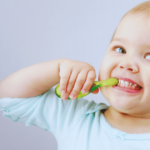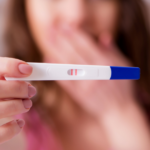When it comes to introducing new foods to your baby’s diet, it’s natural to have questions and concerns. One trendy superfood that has gained popularity in recent years is chia seeds. Known for their nutritional benefits, chia seeds have found their way into many adult diets. But can babies have chia seeds?
In this article, we will explore the safety, benefits, and potential risks of introducing chia seeds to your baby’s diet.
What are Chia Seeds?

Chia seeds are tiny black or white seeds that come from the plant Salvia hispanica. They have been consumed for centuries by ancient civilizations, such as the Aztecs and Mayans, for their energy-boosting properties. Chia seeds are rich in nutrients like fiber, omega-3 fatty acids, protein, and various vitamins and minerals.
Nutritional Benefits
- High Fiber Content: Chia seeds are an excellent source of dietary fiber, which aids in digestion and can help prevent constipation in babies.
- Omega-3 Fatty Acids: These seeds contain alpha-linolenic acid (ALA), a type of omega-3 fatty acid that supports brain and eye development in infants.
- Protein: Chia seeds provide a plant-based source of protein, which is essential for your baby’s growth and development.
Is Chia Seeds Safe for Babies?

Chia seeds can be safe for babies when introduced appropriately. Generally, it’s recommended to wait until your baby is at least 6 to 8 months old before introducing chia seeds. Younger infants may have less developed digestive systems and may not be ready for such foods. Chia seeds have a unique texture; they can absorb liquid and become gel-like, which may pose a choking hazard for babies who are not accustomed to different food textures. To make them safer, soak chia seeds in water or milk to soften them. It’s essential to monitor your baby for any adverse reactions when introducing them for the first time, although chia seed allergies are rare.
Can Babies Have Chia Seeds?
Safety Considerations
Before introducing chia seeds to your baby’s diet, it’s crucial to consider their safety.
- Age: Chia seeds may not be suitable for very young infants, as their digestive systems are still developing. It’s generally recommended to wait until your baby is at least 6 to 8 months old before introducing chia seeds.
- Texture: Chia seeds can absorb liquid and become gel-like. This texture may pose a choking hazard for babies who are not yet accustomed to different food textures. To make them safer, you can soak chia seeds in water or milk to soften them.
- Allergies: Chia seeds are not a common allergen, but it’s essential to monitor your baby for any adverse reactions when introducing them for the first time.
How to Introduce Chia Seeds
If you decide to incorporate chia seeds into your baby’s diet, here’s how to do it safely:
- Start Small: Begin with a small amount, such as half a teaspoon, and gradually increase the quantity as your baby gets used to the texture and taste.
- Soak Them: As mentioned earlier, soaking chia seeds in liquid can make them easier for your baby to swallow.
- Blend with Baby Food: You can mix soaked chia seeds with baby food, such as pureed fruits or yogurt, to create a smoother texture.
Benefits of Chia Seeds for Babies
Nutrient-Rich Addition
Adding chia seeds to your baby’s diet can offer several benefits:
- Digestive Health: The high fiber content in chia seeds can promote healthy digestion and regular bowel movements.
- Omega-3 for Brain Development: Omega-3 fatty acids support brain and nervous system development, which is crucial during the early stages of life.
- Nutrient Boost: Chia seeds can enhance the nutritional value of your baby’s meals by providing essential vitamins and minerals.
Potential Risks
While chia seeds offer many benefits, there are some potential risks to be aware of:
- Choking Hazard: As mentioned earlier, the gel-like texture of chia seeds when they absorb liquid can pose a choking risk for young babies.
- Allergies: Although rare, some individuals may be allergic to chia seeds. Monitor your baby for any signs of allergies, such as hives, swelling, or difficulty breathing.
What Seeds Are Safe for Babies?
Besides chia seeds, other seeds that are generally safe for babies when introduced at the appropriate age include flaxseeds (ground), sunflower seeds, and pumpkin seeds. As with any new food, it’s essential to monitor your baby for any allergic reactions or digestive issues.
How Do I Prepare Chia Seeds for My Baby?

Preparing chia seeds for your baby involves soaking them to reduce the choking risk. Simply mix a small quantity of chia seeds with water or milk and let them soak until they become soft and gel-like. You can then blend this mixture with other baby foods like pureed fruits or yogurt to create a smoother texture that’s easier for your baby to swallow.
Can a 1-Year-Old Eat Chia Pudding?
A 1-year-old can typically eat chia pudding, provided they have no allergies or digestive sensitivities to chia seeds. Chia pudding can be a nutritious and tasty option for toddlers. However, ensure that the chia seeds are well-soaked to prevent any choking hazards. You can also flavor the pudding with pureed fruits or a touch of honey for added taste.
Conclusion
In conclusion, chia seeds can be a nutritious addition to your baby’s diet, but it’s essential to introduce them with caution. Wait until your baby is at least 6 to 8 months old, soak the seeds to reduce choking risk, and monitor for any allergic reactions. As always, consult with your pediatrician before making any significant changes to your baby’s diet.
FAQs (Frequently Asked Questions)
When can I introduce chia seeds to my baby’s diet?
- It’s generally recommended to wait until your baby is 6 to 8 months old.
How should I prepare chia seeds for my baby?
- Soak them in water or milk to soften their texture, making them safer to consume.
Are there any allergy concerns with chia seeds for babies?
- While rare, some individuals may be allergic to chia seeds. Watch for any allergic reactions when introducing them to your baby.
Can chia seeds help with my baby’s digestion?
- Yes, chia seeds are high in fiber, which can promote healthy digestion and prevent constipation.
Do chia seeds provide any specific nutritional benefits for babies?
- Chia seeds offer omega-3 fatty acids for brain development and essential nutrients for overall growth.
Incorporating chia seeds into your baby’s diet can be a healthy choice, but always prioritize your baby’s safety and consult with a healthcare professional if you have any concerns.
















